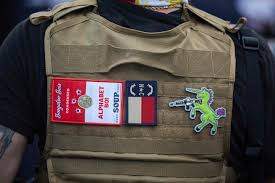Why the FBI had to pretend Hamas wanted to plot with ‘boogaloo boys’

Source: https://www.washingtonpost.com/outlook/2020/09/09/fbi-boogaloo-hamas-terrorism/
Last week, two heavily armed men — part of a movement with a propensity for Hawaiian shirts and anarchy on American streets — got arrested and charged with supporting Hamas. On the surface, their support for the burgeoning “boogaloo” ideology, which seeks to encourage a second Civil War, should place them light-years away from an established overseas Islamist terrorist group. But this unorthodox extremism mash-up is a reflection of serious gaps in domestic terrorism law.
Authorities say Michael Solomon and Benjamin Teeter traveled to Minneapolis during the recent protests and began conducting armed patrols of the city with other members of the boogaloo movement. According to court documents, they engaged with an FBI informant they had initially met on Facebook, who presented himself as a Hamas member. In these meetings, Solomon and Teeter allegedly repeatedly noted their views that Hamas and the boogaloo movement, which also uses the spelling “bois,” shared similar anti-U.S.-government views and expressed their interest in acting as mercenaries for Hamas “as a means to generate cash for the Boogaloo Bois/Boojahideen movement,” saying they required funds “to recruit members and for the purchase of land for a compound to train.”
Solomon and Teeter’s alleged actions did not take place in a vacuum. The boogaloo movement has emerged as a violent anti-government ideology whose adherents have been accused of recently plotting to commit acts of domestic terrorism, and in at least one instance allegedly committed an act of targeted violence in a late May shooting of two U.S. government officials. This ill-defined and dynamic threat has little cohesive organization or central ideology outside of a broad, anti-government accelerationist agenda of provoking societal collapse and civil war through acts of violence.
And the willingness of Solomon and Teeter to allegedly attempt to support the anti-U.S. views of Hamas speaks to the fluidity and flexibility of this amorphous extremist ideology and willingness to work with other extremists.
But it’s a good thing for the FBI that the alleged plotters were that flexible. The introduction of an FBI informant purported to be a member of a designated foreign terrorist organization also represents a necessary strategy by federal law enforcement to properly investigate and prosecute domestic terrorists in the absence of a domestic terrorism statute.
The use of an informant posing as a member of a designated foreign terrorist organization is an investigative tactic often used by the FBI when dealing with potential homegrown extremists seeking to act in support of the Islamic State and Hamas. Last week’s charges, though, represent a unique and noteworthy use of such a tactic to prevent a violent plot allegedly orchestrated by domestic actors with no organic linkages to foreign terrorist organizations.
As others have argued, a terrorism charge for domestic extremists is not simply semantics. The designation carries additional moral and legal importance. It acknowledges to the public and policymakers that the threat of these actors is increasing and connected and they are not simply run-of-the-mill criminal acts. This is more and more pertinent in the face of a rising domestic extremism threat, according to the Trump administration’s own national counterterrorism strategy. Indeed, those types of attacks and plots rose to 63 percent of all those committed or planned in the United States in 2019.
Without a dedicated statute, domestic extremists are typically charged with crimes such as making false statements to illegally purchase a firearm or conspiring to mail threatening communications, which usually carry considerably less prison time than terrorism charges would. Other members of the nascent boogaloo movement have been charged with relatively minor offenses, such as illegal possession of a machine gun or possession of illegal destructive devices. Those carry weaker criminal penalties when compared with the material support to a foreign terrorist organization charge, which recommends a sentence of 20 years in prison.
Quite simply, our current laws treat terrorism differently in this country depending on the whether the ideology is foreign or domestic.
The current legal framework for prosecuting domestic terrorists is ill-suited to adequately combat today’s amorphous terrorist threat in the United States. Without a comprehensive domestic terrorism statute that would have allowed authorities to prosecute people who allegedly sought to commit acts of targeted violence in furtherance of their anti-government ideologies, the FBI was forced to pretend Hamas was interested in working with Solomon and Teeter to unlock criminal charges conspiring and attempting to materially support a foreign terrorist organization. To its credit, the FBI put down a marker that it believed these two men were terrorists, but it was a winding investigative road to get there.
The challenges posed by increasing numbers of post-organizational extremists showcase the need to implement a robust domestic terrorism statute that criminalizes acts of terrorism within the United States, whether in support of white supremacy or anti-government extremism. While concerns rightfully exist over the constitutional protections of speech and assembly and historical overreach by law enforcement to target domestic groups, inaction in the face of a growing threat is not an option.
As it stands now, the FBI is increasingly forced to fit a square problem into a round hole of antiquated laws. Until the law catches up with the threat, we will probably see more idiosyncratic and seemingly convoluted law enforcement tactics against domestic extremists.
Photo: A member of the far-right “boogaloo boys” group at a protest in Charlotte in May. The FBI arrested two other members associated with the group last week on terrorism-related charges. (Logan Cyrus/AFP/Getty Images)











